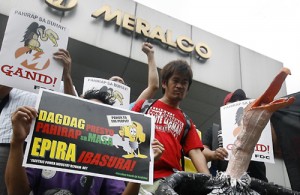Power plant owners who will be proven to have conspired in planning a simultaneous unplanned shutdown can be prosecuted for economic sabotage, the House opposition bloc said on Wednesday.
House Minority Leader Ronaldo Zamora made the threat a day after Energy Undersecretary Raul Aguilos revealed during a House probe that the huge rate increase imposed by the Manila Electric Co. (Meralco) is largely due to the unusual, simultaneous unplanned outages of several power plants, which coincided with the shutdown of the Malampaya natural gas plant which is undergoing maintenance work.
“This is nothing less than economic sabotage. If you do this against the people, I think a very strong case can be made against the power companies, against the maintenance companies, against everybody who is trying to make an extra buck at the expense of the people,” Zamora told reporters.
On Monday, the Energy Regulatory Commission (ERC) allowed the power distribution firm Meralco to impose a P4.15 per kilowatt-hour increase—the highest in Philippine history. Of the P4.15 per kilowatt-hour hike, P3.44 is for generation charge, which Meralco traced to the scheduled shutdown of the Malampaya gas plant and the other power plants, which went on unscheduled outages.
Without the unplanned outages of the other power plants, the rate increase would only have been P1.58 per kilowatt-hour.
Rep. Luz Ilagan of Gabriela said the ERC is also liable because it allowed Meralco to implement the increase.
“That is neglect of duty because the ERC should look after public interest, not merely giving out a clearance,” Ilagan said.
Her fellow Rep. Emmi de Jesus of Gabriela agreed.
“What the ERC did was simply accept the proposal of Meralco to implement the increase in three tranches. The ERC should go the extra mile and prepared a counter proposal to address the outages and the increase that comes with it,” de Jesus said.
In Malacañang, Communications Secretary Herminio “Sonny” Coloma Jr. said the government is doing its best “to ease the people’s burden.”
Coloma said the government is considering other options including tighter monitoring of the schedule of shutdown of power generators.
“In this regard, the DoE has instructed the ERC to look into the outages in several
power plants that occurred while the Malampaya repairs were taking place,” he said.
Under the Electric Power Industry Reform Act (EPIRA) law, the DoE and ERC see to it that power rate adjustments are not driven by anti-competitive or market abuse practices.
The power rate hike prompted several lawmakers on Wednesday to call for the repeal or amendment of Epira, saying the law has not served its purpose to keep power rates affordable.
Senate deputy minority leader Vicente Sotto 3rd said Epira is the reason the Philippines is among the countries in Southeast Asia with the highest power rate.
“Epira is the reason why we have this kind of problem, the law only helped worsen our power generation,” Sotto said.
He said the law, which has been in existence for more than a decade, has done nothing to spare consumers from high power rates.
The Epira law was enacted under former President Gloria Arroyo in 2011 in a bid to lower power rates and lessen government burden by privatizing state-owned power plants.
But based on the recent study conducted by groups like Bagong Alyansang Makabayan (Bayan), Agham and Ibon Foundation, power rates have doubled since Epira was implemented.
According to the study, Meralco rates have increased by more than 112 percent while Napocor rates have jumped by more than 95 percent by 2011.
Sen. Francis Escudero also pushed for the review of the Epira law to determine the specific provisions that need tweaking.
“I have been batting for the repeal, amendment, at least review of the Epira ever since it was enacted into law,” he told reporters.
Escudero added that the ERC could have done more to prevent such a huge power rate increase.
“Definitely the ERC has the authority to grant or reject any application for increase because there is no point for the agency to exist if it doesn’t have such powers,” he said.
The senator also wondered why Meralco was allowed to impose a steep increase when it has not completely refunded its consumer for the double-charged line loss rental it collected from June 2006 to August 2012 totaling to P9.8 billion.
Escudero said the ERC should have factored in the refund and the rate deduction to minimize the increase.


